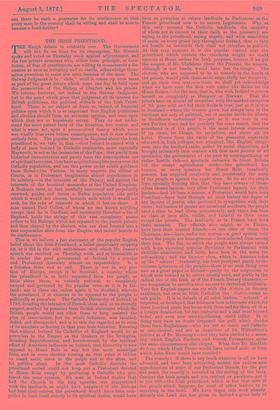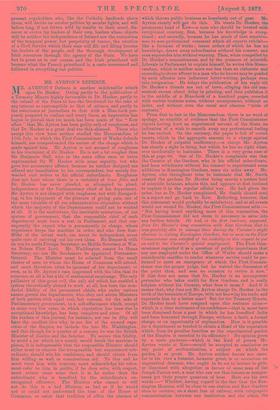THE IRISH PRIESTHOOD.
THEKeogh debate is evidently over. The Government will not fix an hour for its resumption, Mr. Disraeli spoke and voted on Thursday week against adjournment, and the few private members who, either from principle, or fana- ticism, or fear of constituents, are willing to recommence a dis- cussion at once so irritating and so sterile, acknowledge them- selves powerless to resist the tacit decision of the mass. The Galway Judgment is to " slide," until it comes up once more as part of the great debate which must one day be held upon the prosecution of the Bishop of Clonfert and his priests. We return, however, not indeed to the Galway Judgment, but to the point which gives that judgment all its interest for British politicians, the political attitude of the Irish Priest- hood. There is no subject of Irish or, indeed, of Imperial politics upon which it is so important that English politicians and electors should form an accurate opinion, and none upon which they are so hopelessly astray. They do not under- stand the most patent facts of the situation, but reason, and what is worse act, upon a preconceived theory which never was wholly true even before emancipation, and is now almost entirely false. The popular theory in England about the Irish priesthood is, we take it, this,—that Ireland is cursed with a body of men trained in Catholic seminaries, more especially Maynooth, to act as the janissaries of the Pope; that partly from historical circumstances and partly from the unscrupulous use of spiritual terrorism, they have acquired complete power over the Catholic population, and use this power under subtle guidance from Rome—the Vatican, in many respects the silliest of Courts, is in Protestant imagination almost superhuMan in its subtlety—in the interests of the Papacy, and against the interests of the heretical monarchy of the United Kingdom. A Brahmin caste, in fact, carefully instructed and perpetually renewed, guides and forces a Sudra population into paths which it would not choose, towards ends which it would not seek, for the sake of interests in which it has no share. A man named Paul Cullen, of whom no one knows anything except that he is Cardinal, and necessarily therefore a foe of England, holds the strings of this vast conspiracy, passes orders to his Bishops, which are repassed to the parish priests, and then obeyed by the electors, who are thus formed into a vast corporation alien from the Empire, and indeed hostile to its continuance.
This is, we believe, a fair statement of the popular English belief about the Irish Priesthood, a belief perpetually cropping up, as it did in the wild enthusiasm with which Mr. James's speech was received on Thursday week, and so irresistible as to render the good government of Ireland by a popular and Protestant Assembly almost an impossibility. It is a delusion from end to end. There is not in any por- tion of Europe, except it be Scotland, a country where the priesthood is so little separated from the people, so little above them, so entirely national, so completely swayed and governed by the popular voice, as it is in Ire- land ; nor is there one, unless again it be Scotland, wherein the priesthood, if it chances to be opposed to the people, is politically so powerless. The Catholic Hierarchy of Ireland, in 1798, dreading the intrusion of French ideas, and, as we strongly suspect, soothed by promises from British statesmen which the British people would not allow them to keep, resisted the plan of insurrection, lost its whole influence, was insulted, defied, and disregarded, and is to this day regarded as to some of its members as having in that year been forsworn. Knowing that without Ireland the Catholics of England would be as powerless in the Empire as the Quakers or the Irvingites, dreading Republicanism, and horror-struck by the spiritual effect of American influence on Ireland, that hierarchy is now opposed to Home Rule in any but the most municipal form, and in every election turning on that point is bidden to stand aside, serve in the pulpit and at the altar, and y let politics alone. In the most Catholic districts the priesthood united could not keep out a Protestant devoted to Home Rule except by producing a Catholic who pro- fessed the same opinion. No man in Ireland doubts that had the Church in the long agrarian war sympathised with the landlords, as might have happened if the Bishops had kept their estates, the priesthood would have been com- pelled to limit itself strictly to its spiritual duties, would have been as powerless to return landlords to Parliament as the French priesthood now is to return Legitimists. Why, at this very moment the Catholic landlords, the majority of whom are as sincere in their faith as the peasantry, are saying to the priesthood, saying angrily, and with something of scorn, on every grand jury throughout Ireland, that as they are hostile to landlords they shall not interfere in politics. At this very moment it is the popular control over the priesthood which renders the enormous weight we could exercise at Rome useless for Irish purposes, because if we got the weapon, if Mr. Gladstone chose the Primate, the weapon, although in our hands, would have lost its temper. The electors, who are supposed to be so entirely in the hands of the priests, would push them aside respectfully but decisively, and go their own way,—a truth we shall yet acknowledge when we have seen the first vote under the Ballot for the Home Rulers,—for the men, that is, who wish Ireland to govern herself as completely as Hungary or Norway. That the priests have on almost all occasions, with the marked exception of '98, gone with and led their flocks is true, just as it is true in Scotland—where the Geneva gown has always been in the forefront not only of political, but of secular battle for liberty as Scotchmen understand it—just as it was true in our own Puritan time, and for precisely the same reason, that the priesthood is of the people, is the most intense expression of its views, its likings, its prejudices, and above all, its hates. Drawn from the ranks of the peasantry, separately educated in Irish colleges. not admitted, like English clergy- men, into the landlord ranks, galled by social disparities, and brought intimately into contact with that most painful of all spectacles, the government of the poor by unsympathising or rather hostile rich—a spectacle unknown in Great Britain till the recent agricultural strike—the priesthood has become, on every question but Home Rule, fanatically peasant, has supplied constantly and persistently the army of the people as against the upper class. So far are the people from specially desiring this, that they have always of them- selves chosen laymen, very often Protestant laymen, for their leaders—had '48 been a success, a Protestant would have been President—have been through all their history the dupes of any laymen of genius who professed to sympathise with their views ; but leaders of genius are occasional accidents, the people need a class to lead them permanently, and there has been no class at once able, visible, and faithful to their cause except the priests. The landlords, as in France, have been their enemies. The officials, who might, as in France, have been their trusted friends—as one class of them, the Chairmen, are—have under our system—a good system only where the people are homogeneous—been selected from among their foes. The Bar, to which the people have always turned with hope, elevating popular Barristers to Parliament with childlike admiration and faith, have been in the main too self-seeking ; and the literary class, which in America takes up the " natural " leadership, has been paralysed, partly by the extreme ignorance of the people—there is no such thing even now as a great paper in Ireland—partly by the scepticism to which men trained to be critics usually tend, and partly by the radical vice of the Irish as of the French literary character,— the temptation to sacrifice even success to rhetorical brilliancy. Very few English papers can vie with the Nation in literary excellence, but even to Irish Catholics the Nation seems no safe guide. It is in default of all other leaders, " natural," or imported, or developed, that Irishmen turn to the caste which, for three hundred years, has borne with them and for them all that a foreign domination, for two centuries and a half cruel beyond belief, and even now unsympathising, could inflict. In so doing they have no doubt deepened the gulf which divides them from Englishmen—who are not so much anti-Catholic as anti-clerical, and are as impatient of Dr. Wilberforce's politics as of Dr. Manning's—but they have yielded to a neces- sity which English Puritans and Scotch Covenanters under the same circumstances also obeyed. What does Dr. MacHale- do from which Hugh Peters would have turned aside, or from which John Knox would have recoiled ?
The remedy I If there is any truth whatever in all we have advanced, and have been advancing, amidst the endless mis- apprehensions of some of our Protestant friends, for the past five years, the remedy is revealed in the stating of the facts. Content the Irish people and you content or paralyse—put it as you will—the Irish priesthood, which is but that caste of the people which happens, for want of other leaders, to be marching in the front. We have begun this work already. Already the Land Act has given to Ireland a great body of peasant copyholders who, like the Catholic landlords above them, will decide on secular polities by secular lights, and will before long, if not driven wild by insults to their creed, dis- cover or evolve lay leaders of their own, leaders whose objects will be neither the independence of Ireland nor the restoration of the temporal power, but perpetuity of tenure, the creation of a Civil Service which their sons will fill, and filling become the leaders of the people, and the thorough development of Irish resources through the agency of the State. We have but to press on in our course, and the Irish priesthood will become what the French priesthood is, a caste reverenced and followed in everything but politics.



































 Previous page
Previous page